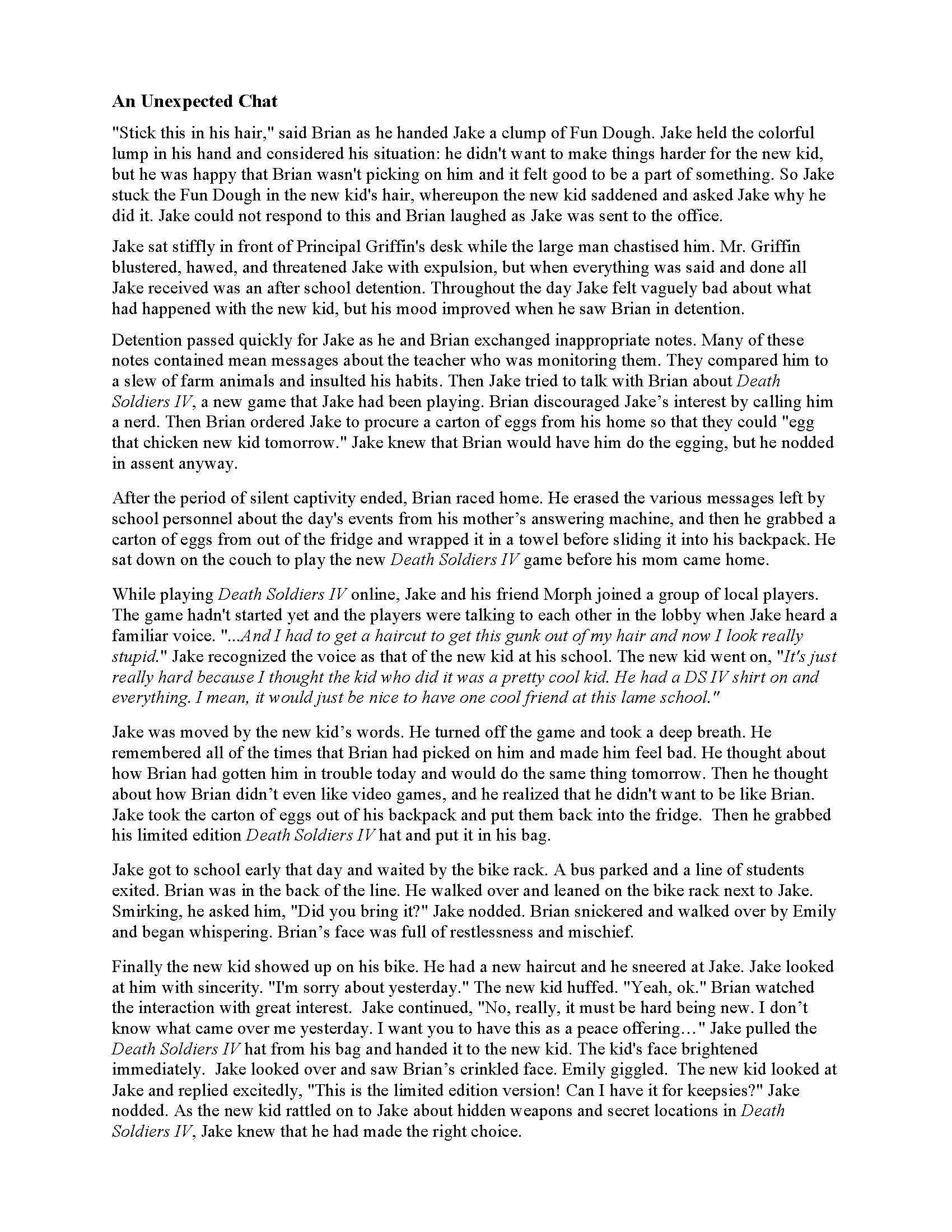Popular Content
Want Email Updates?
Get emails about new stuff.
Be the first to know.
Looking for Something?
"An Unexpected Chat"
Story Structure Worksheet 5
Here's another worksheet to help students review plot, story structure, and elements of literature. This one features a story about a student who learns to resist peer pressure. Students read the story and complete an activity sheet covering story structure and other reading skills. Suggested reading level for this text: Grade 4-8.
Readability Score for "An Unexpected Chat"
Click to VIEW ALL Readability Scores for This Text
SMOG Index
8.8
Average Grade Level
6.2
Based on the readability scores for this text, "An Unexpected Chat" is recommended for students reading at grade levels 4 - 8. This text should be accessible to any student reading at a 4th grade reading level or higher.
4th Grade
← ★ →
8th Grade
Complex
Simple
Story Structure
Common Core State Standards
Story Structure Anchor Standard
R.5 - Analyze the structure of texts, including how specific sentences, paragraphs, and larger portions of the text (e.g., a section, chapter, scene, or stanza) relate to each other and the whole.RL.2.5 - Describe the overall structure of a story, including describing how the beginning introduces the story and the ending concludes the action.
RL.3.5 - Refer to parts of stories, dramas, and poems when writing or speaking about a text, using terms such as chapter, scene, and stanza; describe how each successive part builds on earlier sections.
RL.4.5 - Explain major differences between poems, drama, and prose, and refer to the structural elements of poems (e.g., verse, rhythm, meter) and drama (e.g., casts of characters, settings, descriptions, dialogue, stage directions) when writing or speaking about a text.
RL.5.5 - Explain how a series of chapters, scenes, or stanzas fits together to provide the overall structure of a particular story, drama, or poem.
RL.6.5 - Analyze how a particular sentence, chapter, scene, or stanza fits into the overall structure of a text and contributes to the development of the theme, setting, or plot.
RL.7.5 - Analyze how a drama’s or poem’s form or structure (e.g., soliloquy, sonnet) contributes to its meaning.
RL.8.5 - Compare and contrast the structure of two or more texts and analyze how the differing structure of each text contributes to its meaning and style.
RL.9-10.5 - Analyze how an author’s choices concerning how to structure a text, order events within it (e.g., parallel plots), and manipulate time (e.g., pacing, flashbacks) create such effects as mystery, tension, or surprise.
RL.11-12.5 - Analyze how an author’s choices concerning how to structure specific parts of a text (e.g., the choice of where to begin or end a story, the choice to provide a comedic or tragic resolution) contribute to its overall structure and meaning as well as its aesthetic impact.
Click to VIEW Grade Level Standards for R.5
Looking for More Story Structure Worksheets?
Here are all of our Story Structure Worksheets
Looking for Something Else?
Search This Site
Subscribe Now
Get emails about new stuff.
Don't worry. I hate spam too.
Some Other Useful Pages
- Author's Purpose Worksheets
- Characterization Worksheets
- Conflict Worksheets
- Fact and Opinion Worksheets
- Figurative Language Activities
- Figurative Language Poems with Questions
- Genre Activities
- Irony Worksheets
- Making Predictions
- Mood Worksheets
- Nonfiction Passages and Functional Texts
- Parts of Speech Worksheets
- Poetic Devices
- Point of View Worksheets
- School Project Ideas
- Setting Worksheets
- Simile and Metaphor Worksheets
- Story Structure Worksheets
- Text Structure Worksheets
- Theme Worksheets
- Tone Worksheets
- ALL PAGES AND WORKSHEETS
Search This Site






